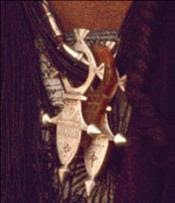Attayoub Abdoulahi, who is President of the organization Temoust (Tuareg Cultural Survival), and is a Tuareg from Niger, has written a new editorial in French (March 1, 2010) concerning the recent coup d’état in the Republic of Niger. What follows is a summary.
CLICK HERE FOR ORIGINAL EDITORIAL IN FRENCH
The elimination of Tandja as the country’s president does not mean that democracy is being “restored,” since there has never been a true democracy in Niger. Force is not necessarily the best way to overcome the shortcomings of the political leadership. The coup may produce more problems than it can solve, since it reinforces the widespread belief that change can not happen through democratic channels.
What Niger needs is an understanding of the root cause of the country’s instability, and the fact that the political elites have not been capable of establishing rules of governance that are shared by the entire population – rules that could be defended against any potential usurper.
The only way that the current political class will stop wallowing in its contradictions, keeping the country in a state of chronic instability, is if the transition government acts from an enlightened and patriotic perspective, through a major overhaul of the Republic.
Much depends on the personality of the new head of state, who must realize that he will be taking on a challenge with history. His credibility will be measured by his capacity to shed the image of a facilitator in the service of a clan, and demonstrate that he is acting in the interest of the entire country, and all of its peoples.
Genuine political reform would involve a redistribution of the cards, and a renewal of the political class – not just tossing the word “democracy” around, but making the effort to define what we mean by democracy, creating rules of governance such that every Nigerien will feel represented and protected by the country’s institutions.
Without a sustainable, quality foundation that is resistant to the vagaries of cyclical policies, we are just “making braids on top of lice,” (alataf fel chilken), as the Tuareg saying goes. Nigeriens need to see the country moving toward a better tomorrow.
The struggle against institutionalized corruption is a priority at all levels of government. Justice must find a way to end the culture of impunity. One’s membership in a sociocultural group must not be a handicap, nor a springboard for personal success.
We do not feel that the transition government should be hurried toward elections. We are once again at a crossroads that might lead toward a better tomorrow, but the worst is always possible.
We need time to conduct a broad national consultation, whose findings could be used to draft a new constitution. We need a broad national dialogue, debates without taboos or fallout.
This must address the issue of the North in a spirit of reconciliation and nation building. A working group could undertake to do an inventory on issues of the North, and propose areas to be discussed at a national forum.
A definitive resolution of issues of the North is all the more urgent, since the geopolitical context is becoming increasingly threatening. Niger cannot afford to maintain internal bickering that exposes the country to all sorts of impulses.

